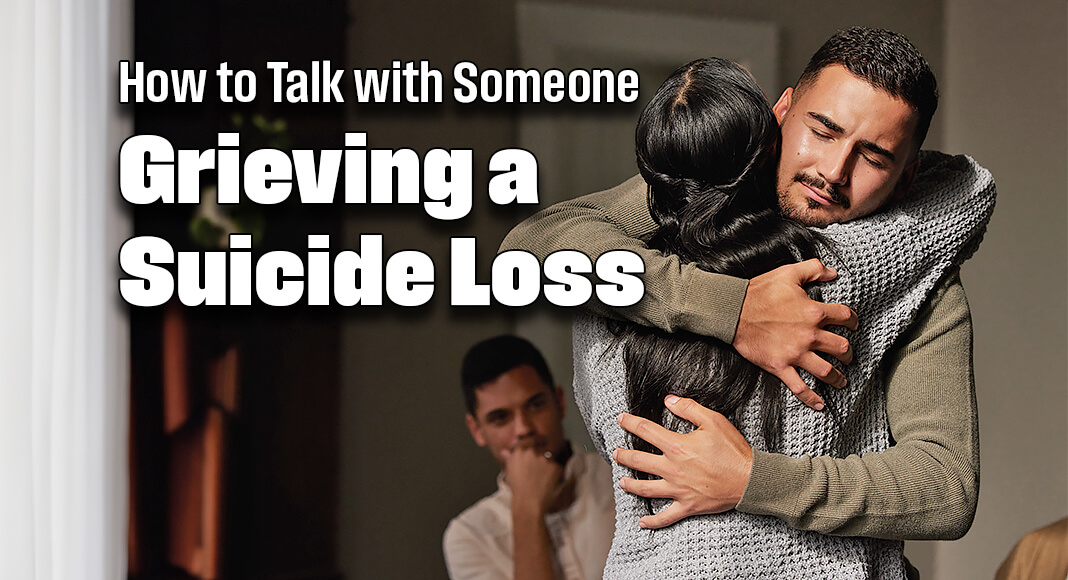
Mega Doctor News
Mayo Clinic Staff
In 2021, suicide was the 11th leading cause of death in the U.S., claiming the lives of more than 48,000 people — nearly double the number of homicides. People of all ages, ethnicities and backgrounds choose to end their own lives. That means that people of all ages, ethnicities and backgrounds may be affected by suicide.
When learning that a loved one, friend, neighbor, work colleague or child has lost someone to suicide, you want to support them. Your first thought might be, “What do I say?”
Supporting someone grieving a suicide loss can be uncomfortable and even a bit scary. The support you provide is crucial to helping them navigate this tragedy, and it’s essential to their mental health. Be aware that those who have lost someone to suicide are at a higher risk of dying from suicide, as well.
How to start the conversation about suicide
People who have lost a loved one to suicide may consider themselves a survivor. They may be experiencing a complex range of feelings from grief to anger, shame and fear. Being present and showing you care — without judgment — plays a vital role in supporting them.
When talking with the survivor, show you still remember their loved one. Use the person’s name, share memories and maybe even photos of time spent together. Talking openly about the person can help remove the stigma of their death. Sometimes, all you need to do is listen.
The survivor may ask unanswerable questions, such as, “I don’t understand how this happened,” or “How could they do this to me?” Validate those thoughts and acknowledge that neither of you has the answers. Provide support with statements such as, “This is very hard for you, and I’m sorry that I don’t have any answers.”
Maintaining connection after loss
Often, a survivor hears most from their circles of family and friends shortly after the death, but then the connections taper off. The survivor’s emotions and feelings haven’t tapered off. That’s why keeping in touch is so important.
Holidays, anniversaries, birthdays and other milestone events can be particularly difficult for survivors because they conjure up intense memories and emotions about their loved ones. Check in with survivors around these times. A “thinking of you” card, email or text may be all they need to know you’re there for them. They may also ask for space, and that’s OK too.
Also, remember to include the survivor in activities. If you’ve frequently met for coffee, extend the invitation again. If they enjoy the theater, ask if they’d like to go to a show with you. If the answer is “no,” accept it and don’t push, but don’t give up on them. The time will come when they say, “Yes.”
Be aware of suicide warning signs
Because survivors are at greater risk of dying from suicide, pay attention to them. Listen to what they’re saying and what they’re not saying. And although it’s uncomfortable for you — without judging them or minimizing their feelings — gently ask if they’re having thoughts of suicide themselves.
Here are some questions to consider:
- Do you feel you have no hope for the future?
- Do you feel you’d be better off dead?
- Do you feel your loved ones would be better off without you?
- Do you think you might try to hurt yourself today?
- Have you had thoughts of suicide?
- Have you been thinking of killing yourself?
- Have you thought of ways you might hurt yourself?
- What would you do to end your life?
Setting aside your discomfort to ask a few questions can help the survivor feel supported and less alone, isolated and hopeless.
If you’re concerned for the survivor, here are some warning signs to watch for:
- Acting anxious, agitated or behaving recklessly
- Experiencing extreme mood swings
- Increasing use of alcohol or drugs
- Looking for a way to kill themselves like searching online or buying a gun
- Showing rage or talking about seeking revenge
- Sleeping too little or too much
- Talking about being a burden to others
- Talking about feeling hopeless or having no reason to live
- Talking about feeling trapped or in unbearable pain
- Talking about wanting to die or to kill themselves
- Withdrawing or isolating themselves
If you see these signs and are with the survivor, call 988, the national suicide and crisis line, a local crisis center or take them to the nearest emergency department.
Everyone plays a role in suicide prevention. Stay connected with a survivor, listen to them, be aware of risks and warning signs, and don’t hesitate to offer help when needed.
Resources
Note these crisis phone resources:
- 988 Suicide and Crisis Lifeline
Call or text 988 or chat at 988lifeline.org. - Crisis text line
Text “HOME” to 741-741. - For veterans
Call 988, then press 1.
Text 838255.
Chat at Veterans Crisis Line.
Jessie Wolf is a clinical social worker in Psychiatry & Psychology in New Prague, Minnesota.
This article first published on the Mayo Clinic Health System blog.










